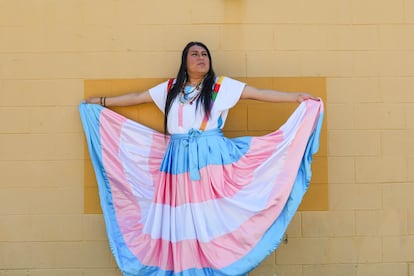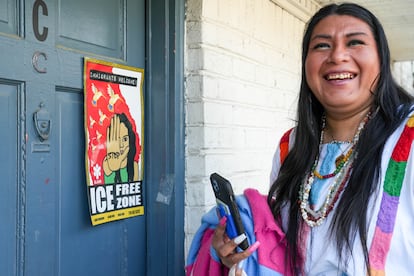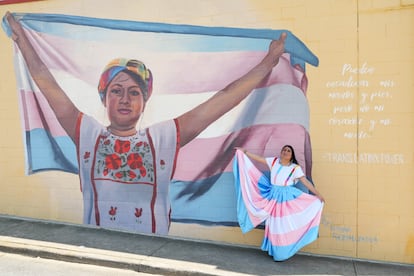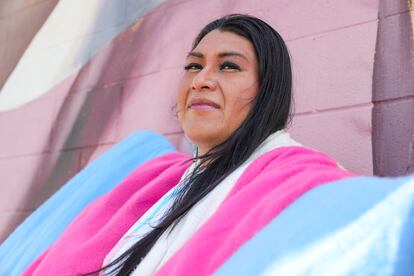Li Ann Sánchez, a trans and Indigenous activist supporting LGBTQ+ immigrants in the United States: ‘We are living in a new era of transphobia and xenophobia’
The Mexican asserts that organizations defending the community are operating under an even more intimidating climate since Trump returned to power

Li Ann Sánchez was born twice. The first time was 37 years ago, in the confines of the Chinanteca region, between the Mexican states of Veracruz and Oaxaca. Her second birth took place in Mississippi, after finishing a drag show in which she performed as Selena. The queer and African American audience dubbed her the “star” of the place. Since then, she’s been known as Li Ann “Estrella” Sánchez (“estrella” meaning “star” in English).
Throughout her life, the Mexican activist has had to overcome the triple discrimination of being an immigrant, a trans woman and Indigenous. In 2018, she founded Communidad Estrella, translated as “the star community.” This not-for-profit organization is dedicated to defending the rights of undocumented migrants — regardless of race or nationality — with a focus on the LGBTQ+ community.
Following a landmark ruling in the state of Georgia, Sánchez obtained asylum status — becoming the first trans woman to receive it — and legal residency. This was after more than a decade of irregular status in the U.S. Between 2009 and 2010 (she doesn’t remember the exact date), she was detained for 30 days for possessing hormones that she had bought at an illegal pharmacy.
Li Ann has also been a sex worker and a victim of human-trafficking networks operating along the border. “In Cancún, when I wasn’t even of legal age, I met a woman who [lured me]. She told me, ‘You’re going to the United States, you’ll be taking care of an elderly woman and you’ll make a lot of money.’ I don’t even know how they got me across. I woke up in Texas, locked in a room without seeing sunlight [...] I had sex with other young men at gunpoint. I don’t know how to describe this evil,” she confesses.
Fortunately, she was able to escape and returned to Mexico. But her stay was brief: just a few months later, she crossed the border again. At the time, Barack Obama’s second presidential term was beginning. Immigration and Customs Enforcement (ICE) raids multiplied in many parts of the country. Under the 287(g) program, which establishes cooperation between local police officers and immigration agents, she was detained for the second time, with the added aggravating factor of having failed to comply with a prior court summons, which was on her record. Such an offense is considered to be a felony.
“Many immigrants make the same mistake, because we’re unfamiliar with the American judicial system,” she notes. She was incarcerated for a year. At the Atlanta City Detention Center — the first facility where she was held — they didn’t know whether to place her with men or women. “They criminalized me for being a trans woman. They dressed me in red, like the most dangerous criminals. They locked me up in solitary confinement, the famous ‘hole.’ They performed horrific checkups on me; they broke my ear and they kept me on medication, like a mentally ill person. I was on the verge of being sexually assaulted, but I fought back,” she recalls, describing the abuse she suffered during her detention. Unlike similar facilities in, say, California — which have rooms or cells exclusively for the trans community — Georgia doesn’t offer these types of considerations for the LGBTQ+ population. Nor do the state facilities offer hormone therapy. “No undocumented person [receives it] and that’s one of our biggest demands,” she adds.

After taking on her case, lawyers from Immigration Equality managed to secure her freedom. During the six years it took to obtain asylum and form her own organization, she was involved with other groups that are dedicated to informing the detained migrant community about their rights, reaching out to them in shelters and detention centers. She also succeeded in helping Mexican trans immigrants in the United States get their birth certificates rectified. As a result, each individual can be recognized by their own name and gender identity. “I left prison with an enormous thirst for justice, hoping that no one else would be locked up in those unhealthy, inhumane conditions, suffering physical and emotional abuse. Those centers must close,” she affirms. “For years, I carried out my activism with an ankle bracelet that allowed them to track my every move, under the threat of deportation.”
Donald Trump’s return to the White House was followed by his signing of executive orders against inclusion policies in the federal government and gender variance, resulting in the denial of the existence of trans people. This has been a setback for Sánchez and her community. In fact, attacks against this group — far from decreasing — continue to grow. According to the Trans Murder Monitoring research project, 350 trans and gender-diverse people were murdered worldwide between October of 2023 and September of 2024: 70% of these deaths occurred in Latin America and the Caribbean. Meanwhile, in the United States, hate crimes increased from 31 to 41 during this same period.
Question. Under this new administration, what are the conditions for organizations that are working to defend the rights of the trans and migrant communities?
Answer. We’re experiencing a new era of transphobia and xenophobia. We know that all the organizations that work on behalf of immigrants are being investigated. To protect ourselves, we’ve decided to [take down] our website. We’re also being cautious when making statements. When we go out to protest, we’re covering our faces with masks, sunglasses and hats. We’re also not sharing our events on social media. But we continue the fight.
Q. Did you pause your tours to educate the migrant and LGBTQ+ communities about their rights?
A. Through the efforts of many organizations, we’re keeping the community well-informed… but ICE agents are using tactics that are leaving everyone defenseless. They wait for you on street corners, no matter for how long. They stay there until they catch you, either when you’re coming home from work, or whenever you least expect it. I don’t know if they’re monitoring [people] by phone to know what time they may arrive home or wherever they’re going, but that’s what’s happening in Atlanta.
Q. Do you have any records of arrests and deportations of LGBTQ+ immigrants that have occurred in recent weeks?
A. They’ve taken two. A Mexican woman arrived [in the U.S.] with CBP One. They came to her home, almost breaking down her door. She didn’t show up for an immigration court date, so they arrested her. While she was detained, she told me: “They came after me and I don’t want to be in this country anymore.” So, she signed her deportation form. We also recorded the case of a Honduran woman who was taken while she was shopping. She also decided to leave.
Q. For many LGBTQ+ migrants, returning to their countries of origin poses a risk to their lives…
A. That’s right. Sadly, this was the case for one of our colleagues, Melissa Núñez. She lived between New York, Tennessee and Atlanta. She was a sex worker. She requested permission to travel to her country, Honduras (Sánchez doesn’t specify her immigration status). When she returned [to the U.S.], she was denied entry due to Title 42 and was deported. A week or two later, she was murdered, in circumstances that are still unclear. [Members of] the LGBTQ+ community [who are] in this country as refugees cannot be expelled.
Q. Despite your activism and the protection afforded to you by your asylum status, are you afraid to go out on the streets now?
A. Yes, because executive orders are constantly changing. It all depends on how the president reacts. Maybe tomorrow he’ll decide that all trans people should cut their hair. What do I know?
Q. You’ve fought for the closure of migrant detention centers, but Trump’s immigration agenda is incentivizing them...
A. I’m part of a coalition of organizations that remains focused on achieving this goal. Millions of dollars are being invested in detention centers where human rights are violated. And I say this because I’ve experienced it. The government is paying $110 a day for each immigrant who’s detained in these private prisons. What’s happening is that these companies are getting rich. We’re just a business for them. When you investigate a little about who are behind these companies, you’ll find that they’re white people who hold power in the United States. Many of them supported Donald Trump. All of this is planned.

Q. Amid these circumstances, what programs are continuing at Comunidad Estrella?
A. We continue with our Salud y Vida program (“Health and Life”), which addresses everything related to HIV awareness, as well as hormone replacement therapy. Vivamos en Paz (“Let’s live in peace”) is another project to prevent and address sexual assault or violence, bullying and more. We also promote the labor rights of the trans community.
We have a community center, which belonged to our co-founder, where we can meet and offer various types of assistance [to LGBTQ+ migrants]. We also continue to visit migrant shelters and detention centers to help [individuals] with whatever they need, including legal and psychological counseling. We don’t provide this assistance directly, but we serve as a bridge with other organizations. It’s a networking effort.
Q. Are you afraid that you’ll lose the aid or funding required to operate for the next four years?
A. We receive funding from larger organizations and have applied for federal funding. In this last [round of applications], we can no longer use the words trans, queer, immigrant... we have to be resilient.
Q. What’s your greatest wish since you started this fight?
A. [Getting my] U.S. citizenship.
Q. Really?
A. I wish I didn’t have to fight for everything. To live without having to flee or be careful about what I say. Without having to suspend my organization’s website, review the annual work plan, the brochures... my greatest dream is to live with dignity.

Sign up for our weekly newsletter to get more English-language news coverage from EL PAÍS USA Edition
Tu suscripción se está usando en otro dispositivo
¿Quieres añadir otro usuario a tu suscripción?
Si continúas leyendo en este dispositivo, no se podrá leer en el otro.
FlechaTu suscripción se está usando en otro dispositivo y solo puedes acceder a EL PAÍS desde un dispositivo a la vez.
Si quieres compartir tu cuenta, cambia tu suscripción a la modalidad Premium, así podrás añadir otro usuario. Cada uno accederá con su propia cuenta de email, lo que os permitirá personalizar vuestra experiencia en EL PAÍS.
¿Tienes una suscripción de empresa? Accede aquí para contratar más cuentas.
En el caso de no saber quién está usando tu cuenta, te recomendamos cambiar tu contraseña aquí.
Si decides continuar compartiendo tu cuenta, este mensaje se mostrará en tu dispositivo y en el de la otra persona que está usando tu cuenta de forma indefinida, afectando a tu experiencia de lectura. Puedes consultar aquí los términos y condiciones de la suscripción digital.









































